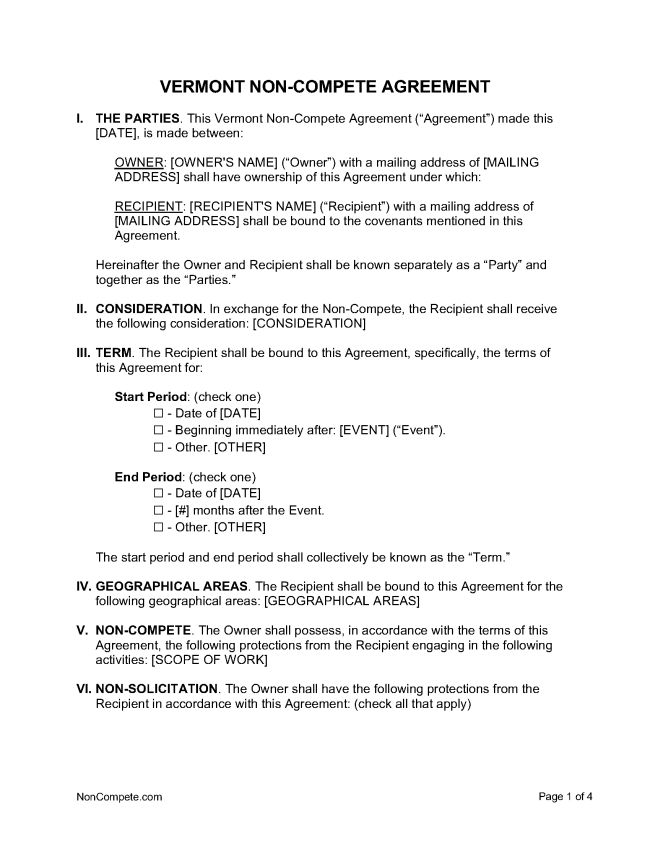A Vermont non-compete agreement is a contract that places boundaries on a person’s ability to engage in certain commercial activity. Non-competes serve to protect businesses from unfair competition. However, because these agreements inherently restrict individual freedom and interfere with freedom of trade, courts look upon them with a critical eye and will always seek to balance legitimate commercial interests with personal liberty and the public good.
Table of Contents |
Are Non-Competes Enforceable in Vermont?
Non-compete agreements are enforceable in Vermont if they are reasonable and justifiable. If a non-compete goes beyond the scope of what is necessary to protect to the interests of a business, runs contrary to the public interest in freedom of trade, or places unreasonable burdens on the party against whom it’s being enforced, it will likely not hold up in a court of law. (Systems Software, Inc. v. Barnes (2005))
Valid non-compete agreements must be supported by a broader transaction, such as an employment relationship or the sale of a business. Non-competes outside the context of such a legitimate exchange of value are considered unacceptable restraints on trade. (Summits 7, Inc. v. Kelly (2005))
Reasonableness
Courts are reluctant to enforce agreements that impose restraints on a person’s ability to practice their chosen profession. Therefore, non-competes—especially those ancillary to employment agreements—must be drafted narrowly.
Reasonableness is determined on a case-by-case basis, but all non-compete agreements must be justified based on legitimate business interests and limited in scope so as not to be overly burdensome. Standards of scrutiny vary depending on the nature of the agreement. Non-competes that are part of employment contracts are viewed with a high degree of skepticism as to time and territorial boundaries, whereas non-competes arising in the sale of a business may be considered reasonable with more expansive terms. (Vermont Electric Supply Co. v. Andrus (1974))
Protectable Interests
The activity a non-compete seeks to limit must be specific to a company’s legitimate interests. The agreement should be drafted such that the restricted activity would otherwise pose actual harm to the business. Interests that a non-compete agreement can protect include:
- Trade secrets (§ 4601(3))
- Confidential information, such as pricing and product knowledge (Systems Software, Inc. v. Barnes (2005))
- Goodwill and customer relationships (Systems Software, Inc. v. Barnes (2005))
- Significant investments in special training and experience (Vermont Electric Supply Co. v. Andrus (1974))
Attorneys (prohibited)
Vermont’s Rules of Professional Conduct preclude attorneys from entering any contract that limits their right to practice law, except agreements concerning retirement benefits or the sale of a law practice. (Rule 5.6)
Burden of Proof
The employee or party seeking to avoid enforcement has the burden of demonstrating that the terms of the agreement are unreasonable. (Dyar Sales & Machinery Co. v. Bleiler (1935))
Continued Employment (consideration)
Under principles of contract law, non-compete agreements must be supported by an exchange of value in which each party both gives something up and stands to benefit. The promise of new employment is typically sufficient, but whether the continuation of an existing employment relationship constitutes valid consideration is a matter that varies by jurisdiction.
In Vermont, continued employment is considered sufficient consideration to uphold a non-compete. As the court opined in Summits, “every day of an at-will employment relationship is a new day.” The employer promises additional value with each day the employment relationship continues. If, however, the employer acts in bad faith by terminating an employee shortly after they enter a covenant not to compete, the agreement will not stand in the absence of legitimate consideration. (Summits 7, Inc. v. Kelly (2005))
Maximum Term
Vermont courts have not set term limits for non-compete agreements, instead evaluating what is reasonable given the individual circumstances of each case.
In Fine Foods, Inc. v. Dahlin (1986), the court found reasonable a five-year, twenty-five mile restriction on the seller of a restaurant. Another five-year covenant was upheld in Vermont Electric Supply Co. v. Andrus (1974), this time restraining an employee who received highly specialized education and training.
Blue Penciling (allowed)
A non-compete agreement can be partially enforced to the extent that it is valid, even if some of its terms are unenforceable. This is a practice known as “blue penciling” or court reformation whereby courts can strike certain parts of a contract without otherwise modifying its terms.
The Supreme Court of Vermont in Summits 7, Inc. v. Kelly (2005) reversed the rule set forth in Roy’s Orthopedic, Inc. v. Lavigne (1982), noting that the “all-or-nothing” principle of enforceability is outdated. So long as the agreement meets the requirements of consideration, reasonableness, necessity, and legitimacy, overbroad terms in one area will not undermine the agreement as a whole.
